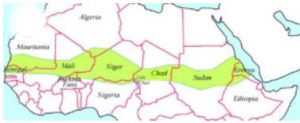 Obvious, that very complex question is now more frequently raised than ever before. It calls for an answer. Ten years of wars – with international forces support – deaths, injuries, displacements and budgets in billions of dollars, have not reduced terrorists presence or expansion. Isn’t it then time to change – analysis, strategy and combat – to openly ask, experts and especially the victims, that is to say the populations?
Obvious, that very complex question is now more frequently raised than ever before. It calls for an answer. Ten years of wars – with international forces support – deaths, injuries, displacements and budgets in billions of dollars, have not reduced terrorists presence or expansion. Isn’t it then time to change – analysis, strategy and combat – to openly ask, experts and especially the victims, that is to say the populations?
The forthcoming conference, convened by the EU Special Envoy to the Sahel, to be held in Tunis on 22 November, should be an opportunity to bring in a fresh look on the region.
Fighting and disillusionment.
In reality, the Sahel has been in turmoil since the 1990s, with the triumphant return to North Africa of jihadists back from their fight in Afghanistan. Terrorist violence gets consolidated on the bankruptcy of the one party system then prevailing in the Sahel. As a new ideology and a source, if not of employment, at least of prestige, terrorism, by spreading very quickly in the region, impressed and attracted a large number of youth. Today, most people feel that the end of the cycle is still far away from the horizon.
Terrorism then offered an ideological basis and also the justification for many local revolts and rebellions. Among these, the recurring conflicts, between nomadic herders and sedentary farmer, have taken on a new dimension. The frequency of climatic disasters – severe droughts alternating with violent floods that COP 27 cannot ignore – has weakened agriculture and livestock, putting thousands of young rural people out of work. Their choice was limited to exodus to already overcrowded capitals cities, migration to a neighboring country and overseas, or increasing the jihadists ranks.
However, following its defeat in Algeria and the failure of lucrative material temptations linked to countless trafficking, terrorism adapted to the Sahel tribal and community environment, which was much more favorable. Alongside Al Qaeda in the Maghreb, AQIM and the Islamic State -EI- other groups with names and practices adjusted to the field (Boko Haram in Nigeria and various Katibas as well as the JNIM -Jamaat Nassruel Islam wel Musslimine) have established themselves in the region.
Presently, the reality is more complex. After three decades of brutal violence, multiple destructions and military fights, governments, populations and even terrorists seem ideologically and militarily exhausted.
Are we then witnessing a revival or is it simply “business as usual”, in other words, has armed violence become a routine contestation?
Fightings, negotiations.
Jihadists, AQIM and EIS and their allies do not recognize as legitimate, the Sahel governments they are combatting. Far from being cut off from the world – in fact they are very present on social networks and have their own media – they know that external military assistance has proven its limits, particularly in Somalia and the Sahel and indeed Afghanistan. In addition, very active in the lucrative region gold mining, they have no financial concerns, especially for foreign currency. No negotiation with the enemy except by arms is their course of action. With, in addition, the conviction that, thanks to God, time is on their side.
Should then governments seek to negotiate, indirectly, under the cover of a religious framework? But how to get there when the two main Islamist groups in the region are in armed competition and thus ready to outbid each other? All this is more important since all these movements see Africa as a strategic center, a ground for jihad expansion as well as an area for profitable activities. The military response – national army and foreign forces – remains the most credible one though, at the same time, and to the jihadists’ great satisfaction, it has shown its limits.
The crisis duration and depth, as well as its multiple dimensions – including its international stakes (Russia’ Wagner versus France and its Western allies), encourage taking a long-term view. In other words, fundamental and rather simultaneous reforms of national armies become essential. The main objective is to strengthen governments and states institutions credibility vis a vis populations so that their fight against terrorism is understood and supported.
In this context, it will be interesting to know whether Sahel terrorism is still linked to international organizations or whether it is autonomous in its messages and its operations on the ground. In other words, wouldn’t these organizations be with other objectives less religious and more economic and commercial?
Furthermore, are national armies’ current structures of and defense strategies adapted to the new anti-jihadist combats? From Cameroon and Nigeria to the three borders region (Burkina, Mali and Niger) there is nothing to confirm that. Moreover, continued societies ‘’retribalization’’ hardly favors the rise of strong and truly dedicated national armies.
In fine, states regular patrimonial management helps traffickers, tribalists and terrorists to have bright days ahead of them in the Sahel. That question, the “retribalisation” resurgence on which terrorism is consolidating its forces seems irreversible in several Sahelian states.
Ahmedou Ould Abdallah, president centre4s.org
